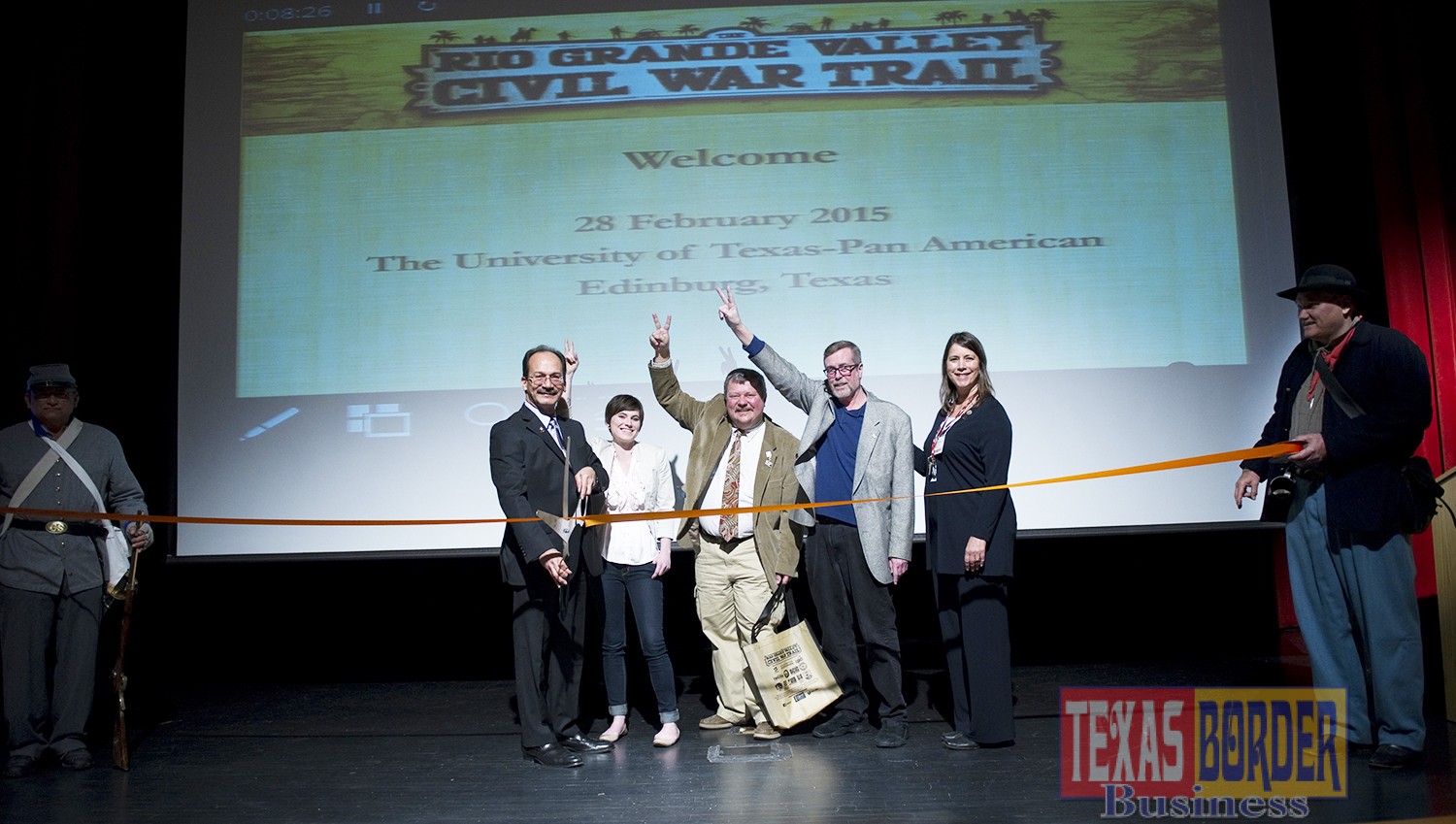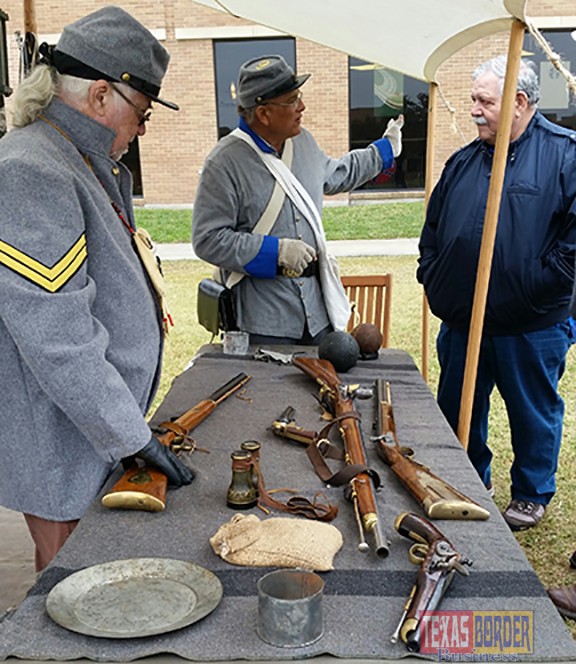
Texas Border Business
For Margil Vale, the Civil War wasn’t just a topic covered in history class. It was a vibrant narration passed down from generation to generation.
Margil grew up in Roma listening to stories about his great-grandfather, John Heinrik Vale, a Swedish immigrant who arrived in New York in 1840 and came to the Rio Grande Valley to volunteer for Taylor’s Army of Occupation during the Mexican-American War. John, a Confederate sympathizer, made a living by transporting bales of cotton along the Rio Grande.
“(John) came around the 1840s, with the American forces fighting the Mexicans in the 1850s. So he goes into Mexico, then comes back to the area of Roma and he marries a woman from Mier (Mexico),” Margil said. “He was in the business of trading cotton, and from Mexico they would get cotton, coffee, sugar that they needed here … He was back and forth, basically buying and reselling.”
His family’s legacy, combined with his passion for history, prompted Margil to attend the launch of Rio Grande Valley Civil War Trail, presented by The University of Texas-Pan American’s Community of Historic Archaeology Project with Schools (CHAPS) Program Feb. 28 at the Student Union Theater.
“I think the information was well presented,” Margil said. “I learned things that I hadn’t heard before, even though the cotton trade was the story of our family, what our ancestors did.”
The RGV Civil War Trail is a virtual tour that includes a map, guide, brochure and associated web page and podcasts, all available in English and Spanish. Together the elements provide a conceptual “walk” through the history of the Civil War in South Texas. Local historians, educators and representatives from local, state and federal agencies provided support for developing the virtual tour.
The trail runs through a five-county stretch between Laredo and Brownsville and has key locations identified on a map, such as the “Robert E. Lee House Museum” in Rio Grande City. These are accompanied by audio podcasts that describe each site’s significance. The podcasts are accessible by cell phone and have an associated QR code that takes visitors to a linked website with additional information.
A six-hour professional development workshop was held Feb. 27 at the UTPA McAllen Teaching Site where 50 K-12 educators learned how to incorporate the trail into their history curriculum.

The RGV Civil War Trail website, explains that the Valley served as a significant point of conflict in skirmishes between Union and Confederate forces along the border between the military forts of Fort McIntosh in Laredo, Ringgold Barracks in Rio Grande City and Fort Brown in Brownsville. The last land battle of the Civil War was fought on May 13, 1865 at Palmito Ranch near Brownsville.
During opening remarks at the ribbon-cutting ceremony, UTPA President Ad Interim Dr. Havidán Rodríguez said the project is history in the making and will help contribute to the growth and development of the region.
“It is a historical event, not only for The University of Texas-Pan American, but for the entire Rio Grande Valley,” Rodriguez said. “This is about building communities, strengthening partnerships to allow us to continue to move forward to recognize the history, the culture, the traditions, the value of the Rio Grande Valley.”
Chris Miller, UTPA history professor, said that over the past nine months, experts and community members contributed their knowledge to help develop the program.
“We realized there was a whole lot more than just that one battle, there were dozens of them and nobody around here knew about that,” Miller said. “The way we do history these days, we want to know more than just the battles. We really want to get more into the lived experience of the people who were here during the Civil War. The best way of doing that is to bring in members of the community, people who know those stories, people whose ancestors lived through it, people who have the pictures, the artifacts and the memories.”
Guest speakers talked about the role of Tejanos in the Civil War, the military experience of African Americans in the Valley, archeological research and the war in Mexico from 1857 to 1867.
Jerry Thompson, a Regents history professor at Texas A&M International University, said not many books credit the role Tejanos and Mexican-Americans played during the Civil War.
“The fact is that Tejanos played a major, significant and most admirable role in the Civil War in Texas,” Thompson said. “At least 3,000 Tejanos served the Stars and Bars (Confederate Army) and 954 Tejanos and Mejicanos joined the Union Army, and of these, 173 in both armies became officers. It is estimated that in the entire country at least 10,000 Mexican-Americans served in the war.”
About 300 attendees received goodie bags with a trail map and other promotional items.
UTPA History Club members encouraged attendees to stop by their booth to sketch drawings of Civil War generals and soldiers. Miriam Cepeda, club president, said many of the club’s members attended the educator’s workshop the day before and were trained to teach material from the RGV Civil War Trail to grades K-12.
“I’ve lived in Rio Grande City so I was already familiar with the city but a lot of students don’t know that Civil War history is right in our backyard,” said Cepeda, a history graduate student.
Outside on the Student Union Quad, was a living history exhibit of a Civil War-era military camp where men decked out in Union and Confederate army uniforms showcased replicas of artifacts, such as rifles, used during that time.
“We started doing military (reenactments) down at Palo Alto about five years ago,” said Donald Drefke (BBA ’76), who donned a Union army uniform. “I figured out that I had an ancestor here in the Union army, Milt Tyner, and he was a corporal.”
Margil, who received his master’s in educational administration from UTPA in 1995 and resides in San Antonio, said he looks forward to visiting the trail’s historic sites, including his great-grandfather’s house in Roma.
“Even though history was not my major, it’s one of those things that I love and I always had my eyes and ears open for,” he said.
CHAPS, established in 2009, seeks to discover the untapped cultural and historical resources of South Texas. Members of CHAPS hope the RGV Civil War Trail will increase community pride, encourage heritage and eco tourism and stimulate the economic development of the region.
Russell Skowronek, director of CHAPS and professor of history and anthropology at UTPA, said the RGV Civil War Trail is the first visible form of integration that covers a 200-mile section of the Rio Grande. He hopes the trail will one day be implemented into the curriculum of local schools. Future goals include filming a documentary and publishing a scholarly book and trail guide.
“I hope we will use it as a springboard to look at other historic periods in the Valley in a broader, regional way, I think there’re other opportunities for us to look at later time periods,” Skowronek said.
To commemorate the 150th anniversary of the Civil War, the Cameron County Historical Commission’s Civil War Sesquicentennial Committee will host a series of events May 11-16, including a reenactment of the Battle of Palmito. For more information on the week-long activities visit their website at www.ph150.us.
To learn more on the RGV Civil War Trail visit www.utpa.edu/civilwar-trail or call their office at (956) 665-3231.















